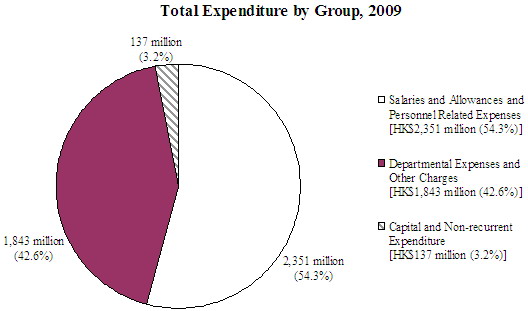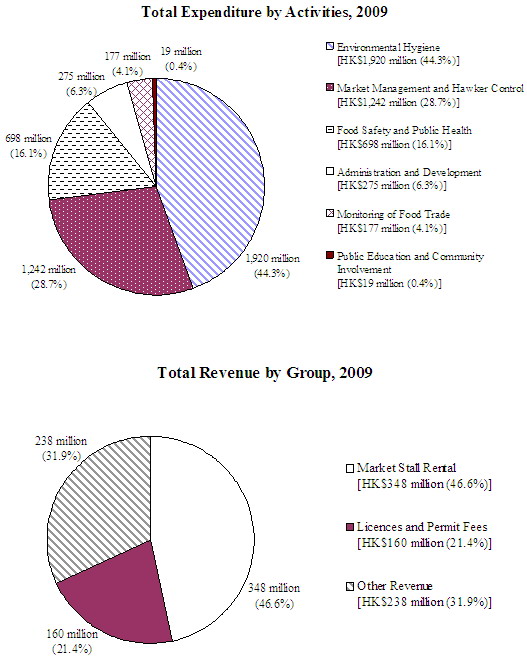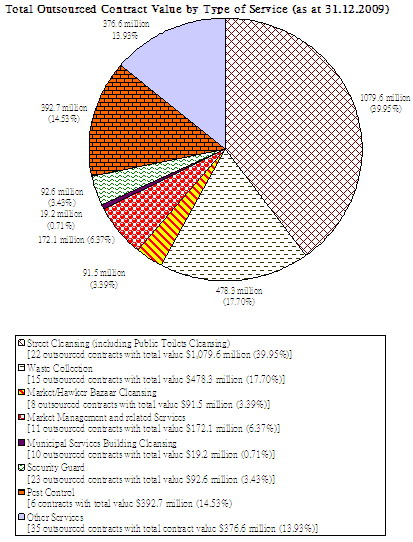The Administration and Development Branch provides various management and support services to the Department.
Grade Management
There are three major grades covering Health Inspectors, Hawker Control Officers and Foremen with two grade managers, one for the Health Inspector grade and another for the Hawker Control Officer and Foreman grades. The grade managers are responsible for staff matters involving manpower planning, career development, postings, promotion and training.
Health Inspectors are responsible for various environmental hygiene and food safety functions, such as handling of environmental nuisance cases, hygiene inspections to food establishments, licensing, prosecution, meat inspection, cleansing services, outsourcing, pest control, hawker control, management of markets, cemeteries and crematoria, food control and health education.
Hawker Control Officers are responsible for controlling on-street hawking activities, managing hawker permitted places and taking law enforcement action against illegal hawking activities. They also play an important part in prosecuting people committing cleanliness offences, such as littering and spitting.
Foremen are mainly responsible for supervising the work of frontline staff in market management, street cleansing, waste collection and pest control, transport services and monitoring the performance of the Department's service contractors. Members of the grade also take legal action against cleanliness offenders.
Training
Training and development aim at enhancing the overall competence and professionalism of staff, bringing out their best to serve the public and heightening their awareness of occupational safety and health. Training programmes mainly take the form of vocational, management, information technologies, occupational safety and communication courses and selected staff would also attend overseas courses.
During the year, the Department organised and co-ordinated 480 classes attended by 11,287 trainees, and adding up to a total of 47,742 trainee-days. Different induction training programmes were given to a total of 587 new recruits aiming to equip them with the necessary competence to discharge their duties. In addition, the Department provided full or partial financial sponsorship to 37 staff members to pursue employment-related studies held outside office hours, and 58 officers were placed in 40 training programmes outside Hong Kong, involving 342 trainee-days.
Management Services
Management consultancy and statistical services essentially make up the work of Management Services. They help management improve the delivery of public services, monitor the standard of performance and formulate policy in the provision of services and staffing. Ongoing consultancies are provided to assist the Department in the implementation of recommendations of studies and technical advice is offered to help the Department to conduct statistical surveys and analyse data.
Five management studies were completed during the year. In addition, a number of statistical surveys were conducted on issues such as public satisfaction on the Department's services or facilities as well as public's attitude to food safety and nutrition labelling.
Financial Management


Note: Figures may not add up to 100% due to rounding.
All matters relating to expenditure and procurement, including payment processing, financial advice and monitoring, are handled by the Finance and Supplies Division.
In 2009, the Department spent $4,331 million, including $2,351 million on salaries and allowances and personnel related expenses, $1,843 million on departmental expenses and other charges, and $137 million on capital and non-recurrent expenditure.
By activities, the majority of the expenditure ($1,920 million) was on environmental hygiene. This was followed by $1,242 million on market management and hawker control, $698 million on food safety and public health, $275 million on administration and development, $177 million on monitoring the food trade, and $19 million on public education and community involvement.
In 2009, the Department received a revenue of $746 million. Most of the revenue came from the rental of stalls in public markets managed by the Department ($348 million) and from licence and permit fees ($160 million). Other sources included revenue from cemeteries and crematoria services ($112 million), meat examination ($22 million) and miscellaneous services ($104 million).
Capital Works
In the Government's 2009 Capital Works Resource Allocation Exercise, the five-year allocation on food and environmental hygiene services capital projects is estimated at $2,260 million. Of the total allocation, about $1,558 million is to meet expenditure on projects under construction or completed with outstanding accounts, while $702 million has been earmarked for new projects.
Markets
During the year, improvement works to Tsuen Wan Market, Wing Fong Street Market, Sheung Wan Market, Po On Road Market and Cooked Food Centre, Fa Yuen Street Market and Cooked Food Centre, Tung Yick Market and Sai Kung Market were completed. Improvement works to Lam Tei Market are in progress.
Refuse Collection Points
As part of the continuing efforts to improve Hong Kong's living environment, the Department is replacing temporary roadside refuse collection points (RCPs) with off-street facilities in enclosed buildings equipped with modern de-odourising installations.
Public Toilets
Under the Public Toilet Refurbishment/Improvement Programme, 18 projects were completed in 2009 and another 43 are in progress or being planned.
To continue the programme to convert all aqua privies into flushing toilets by 2013, works for 76 aqua privies were completed in previous years. Works for 51 out of another 80 aqua privies, which commenced in November 2008 for completion by mid-2010, were completed in 2009. In addition, works for another 90 aqua privies commenced in November 2009 for completion by mid-2011.
Cemeteries and Crematoria
Reprovisioning of Diamond Hill Crematorium (Phase II) involving the provision of two service halls and ancillary facilities as well as the construction of an additional columbarium at Diamond Hill providing 18 500 niches were completed in early 2009. Reprovisioning of Wo Hop Shek Crematorium commenced in July for completion at the end of 2011/early 2012. Planning is underway for the reprovisioning of Cape Collinson Crematorium and Diamond Hill garden of remembrance, as well as the construction of a new columbarium and a garden of remembrance at Kiu Tau Road in Wo Hop Shek.
Outsourcing of Services

By end 2009, 130 contracts valued at $2,702.6 million were in force for the provision of services by private contractors. The outsourcing policy is aimed at greater cost-effectiveness and efficiency in the delivery of services.
Examples of outsourcing services include: street cleansing, waste collection, mechanical street sweeping, mechanical gully cleansing, collection of recyclables, market/hawker bazaar cleansing, market management and related services, pest control services, municipal services building cleansing, security guard services, animal carcass collection, cleansing and undergrowth cutting services for cemeteries and columbaria, etc.
Measurable performance standards are written into contracts to ensure the quality of services provided. Protective clauses have also been included in tenders to safeguard the rights and benefits of non-skilled workers. In addition to daily checking, supervisory checks are conducted to ensure compliance by contractors.
Complaints Management
The Complaints Management Section is responsible for formulating and reviewing policies on, and procedures for, handling all types of complaints. In 2009, the Department received 172,900 requests or referrals for seeking departmental services and 4,800 complaints on staff or operation-related matters.
Quality Assurance
Continuous improvement is one of the priority tasks of the Department to ensure provision of quality services to the public.
The primary objective of the Quality Assurance Section is to monitor and improve service quality. To achieve this objective, the section conducts day-to-day regulatory inspections on services provided by the Department and service contractors. Recommendations are made for improvements to services with identified inadequacies in existing operational systems, procedures and guidelines. The section also recommends good performers for Quality Assurance Awards and Certificates of Meritorious Performance to motivate outstanding and hardworking front-line staff. In addition, the section investigates staff-related cases of dereliction of duty and employment-related complaints of service contractors in an independent, objective and fair manner. The section also conducts audit inspections and employment-related inspections to check service contractors' compliance with employment-related commitments.
Public Education and Publicity
Public education plays an important role in ensuring food safety and improving environmental hygiene. To this end, the Department organises publicity and educational programmes, and arranges exhibitions, outreaching programmes and seminars to enhance the awareness of the general public on these issues.
The Department operates a Communication Resource Unit at the Fa Yuen Street Municipal Services Building and a Health Education Exhibition and Resource Centre inside Kowloon Park.
The Health Education Exhibition and Resource Centre provides group visits and guided tours to schools, elderly centres, children and youth centres, organisations for the disabled and the public. Seminars, talks and outreaching activities are also conducted regularly. During the year, the centre attracted 133,024 visitors, and organised 1,074 talks-cum-activities for kindergartens, primary schools and secondary schools, 1,024 talks for elderly centres and 272 talks for the general public. The Mobile Education Centre (publicity vehicle) of the centre visited over 220 schools, housing estates and public parks in 2009 in promoting public health and environmental hygiene messages.
On food safety, various publicity and educational programmes were organised for the food trade and the public on the Five Keys to Food Safety, the Hazard Analysis and Critical Control Point (HACCP) system, risk perception, and other food safety initiatives and new regulations. Food safety educational programmes were specially organised for the hotels and caterers of the 2009 East Asian Games. Members of the food trade were invited to sign up to the Food Safety Charter 2009 to promote and practise the Five Keys to Food Safety.
To tie in with the enactment of the Food and Drugs (Composition and Labelling) (Amendment: Requirements for Nutrition Labelling and Nutrition Claim) Regulation 2008, a three-year publicity and education campaign is in place to promote the use of nutrition labelling in achieving healthy eating. The theme of the Food Safety Day 2009 held on 11 July was "Turn and Look for Healthier Food Choices" with a view to enhancing consumers' awareness of the Nutrition Labelling Scheme and understanding on the benefits of reading nutrition labels.
To cater for the specific needs of the food trade, seminars on restaurant licensing were arranged on a bi-monthly basis for those who applied for restaurant licences or considered starting a restaurant business.
In 2009, the Department continued its publicity efforts on disseminating environmental hygiene messages through television and radio Announcements in the Public Interest, banners, posters, pamphlets and leaflets. Anti-rodent and anti-mosquito campaigns were organised to solicit public support and participation in controlling pests. Support was also given to cleansing campaign/work by non-government organisations.





